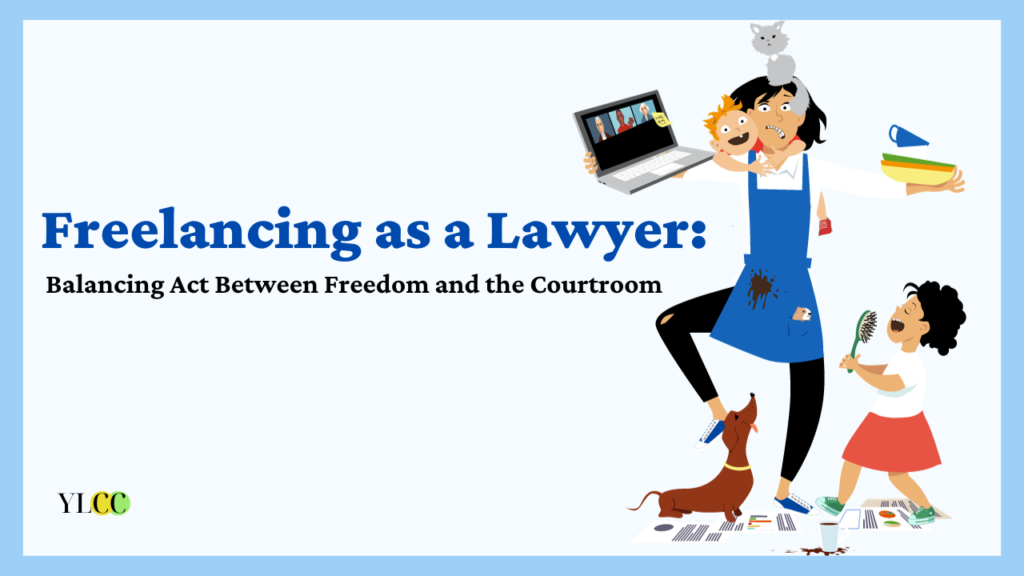
Are you a legal virtuoso seeking the freedom and flexibility of freelancing while maintaining your legal practice? Welcome to the balancing act of freelancing as a lawyer. In this guide, we’ll help you strike that elusive equilibrium between freelance work and legal practice.
The Art of Juggling: Managing Time Efficiently
Freelancing as a lawyer often feels like a high-stakes juggling act, but with the right techniques, you can keep all those balls in the air:
Set Clear Boundaries:
Imagine your day as a pie chart, with slices representing your various roles. Clearly define the boundaries for each slice, allocating specific hours to your legal practice and freelance gigs. This ensures you don’t spread yourself too thin or overcommit to either side.
For example, you might decide that your legal practice takes priority during regular office hours from 9 AM to 5 PM, while freelance work fills your evenings from 7 PM to 9 PM. Weekends might be dedicated to specific legal projects or catching up on freelance deadlines.
By establishing these boundaries, you create a structured work-life balance that prevents burnout and maximizes your productivity.
Prioritize Tasks:
Ever heard of the Eisenhower Matrix? This time management technique can be a lifesaver for freelancing lawyers. It divides tasks into four categories:
- Urgent and Important: These are your top priorities, demanding immediate attention. For your legal practice, this could involve court deadlines or crucial client meetings. In freelancing, it might be an urgent project with a tight deadline.
- Important but Not Urgent: These tasks are vital but can be scheduled for a specific time. In your legal practice, this may include legal research or case preparation. In freelancing, it could be project planning or client consultations.
- Urgent but Not Important: These are tasks that require immediate action but don’t contribute significantly to your long-term goals. In your legal practice, it might involve responding to routine emails or phone calls. For freelancing, it could be client inquiries or administrative work.
- Neither Urgent nor Important: These tasks are low priority and can be eliminated or delegated. In your legal practice, consider outsourcing administrative tasks or research to free up your time. In freelancing, delegate repetitive tasks or non-core responsibilities when possible.
By applying the Eisenhower Matrix to both your legal practice and freelance work, you ensure that your time and energy are directed toward high-impact activities. This strategy keeps you on track and prevents you from getting bogged down by less crucial tasks.
Delegate When Possible:
If you have the luxury of support staff or a legal team in your practice, don’t hesitate to delegate tasks. Delegation frees up your valuable time for both your legal practice and freelancing endeavors.
In your legal practice, assign research tasks, document preparation, or administrative duties to capable team members. This not only lightens your workload but also fosters a collaborative environment.
In your freelance work, consider hiring freelancers or assistants to handle non-core tasks like data entry, content editing, or project management. This ensures that your freelance projects run smoothly without overwhelming you.
Remember, effective delegation is not a sign of weakness but a strategic move to optimize your time and productivity in both your legal practice and freelancing career.
Legal Firm vs. Freelance Work: Finding Synergy
Your legal practice and freelance work can be harmonious partners rather than competing interests. Here’s how to align them strategically:
Specialize Strategically:
Choose freelance projects that align with your legal practice’s expertise and areas of interest. If you’re a family lawyer, consider freelancing in areas like family mediation, counseling, or legal content creation related to family law.
By focusing on projects that complement your legal expertise, you leverage your existing skills and knowledge, making your freelance work more efficient and enjoyable.
Additionally, specializing strategically allows you to cross-pollinate ideas and insights between your legal practice and freelance work, enriching both sides of your career.
Leverage Cross-Selling:
If ethical guidelines permit, explore cross-selling opportunities between your legal practice and freelance clients. For instance:
If you specialize in intellectual property law in your legal practice, offer freelance clients intellectual property audits or trademark consultations.
If you have expertise in real estate law, provide freelance clients with legal advice on property transactions or contract reviews.
Ensure full transparency with clients about the dual nature of your services and adhere to all legal and ethical obligations. Cross-selling can enhance client relationships and generate additional income streams while providing comprehensive solutions to clients.
Client Referrals:
Encourage clients in your legal practice to refer potential freelance clients and vice versa. Establishing a referral network can help you tap into a broader client base and maximize your opportunities in both fields.
Consider offering incentives for referrals or creating a formalized referral program. Engage with your legal and freelance clients to educate them about the complementary services you provide.
By nurturing a referral network, you can access a continuous stream of clients who appreciate the holistic approach you offer through your legal practice and freelance work.
The Digital Dojo: Harness Technology for Efficiency
Embrace technology as your ally in streamlining both your legal practice and freelance work:
Legal Practice Management Software:
Invest in legal practice management software tailored to your specific legal niche. These platforms automate administrative tasks, case management, document storage, and client communication, allowing you to focus on higher-value legal work.
Popular legal practice management software options include Clio, MyCase, and PracticePanther. Choose one that aligns with your firm’s needs and integrates seamlessly with your freelancing commitments.
Freelance Platforms:
Utilize dedicated freelance platforms such as Upwork, Freelancer, or Fiverr to efficiently find freelance clients and manage projects digitally. These platforms offer tools for proposal submission, client communication, and project tracking.
By leveraging freelance platforms, you can access a vast pool of potential clients and streamline the freelancing process, from project discovery to payment collection.
Digital Collaboration Tools:
Embrace digital collaboration tools like Slack, Trello, or Asana to coordinate with legal teams and freelance clients seamlessly. These platforms facilitate real-time communication, project planning, and task management.
For your legal practice, these tools enhance collaboration among team members and improve client communication. In freelancing, they ensure efficient project progress tracking and client engagement.
By harnessing technology, you empower yourself to handle the demands of both your legal practice and freelance work with ease and efficiency. These digital tools become your virtual assistants, allowing you to focus on high-impact tasks in both realms.
The Freelance Feast and Famine: Staying Financially Secure
Freelance income can be a rollercoaster ride, with periods of abundance followed by lean times. To ensure financial stability and weather the feast-and-famine cycle:
Emergency Fund:
Building an emergency fund is your financial safety net. Aim to save at least three to six months’ worth of living expenses in a dedicated savings account. This fund will come to your rescue during slow freelance months, ensuring you can cover essential bills without stress.
Diversify Your Income:
While freelancing is a valuable income stream, consider diversifying your revenue sources to reduce financial reliance on it. Explore options such as:
- Online Legal Courses: Create and sell online legal courses, leveraging your legal expertise to educate a broader audience.
- Legal Consulting: Offer specialized legal consulting services to individuals or businesses seeking expert advice.
- Investments: Consider investment opportunities that align with your financial goals and risk tolerance.
Diversification provides a safety net when freelance work is scarce and allows you to maintain financial security.
Budget Wisely:
Creating a comprehensive budget that accounts for both your legal practice and freelance earnings is essential. Include all income sources and categorize expenses, prioritizing essentials like rent or mortgage, utilities, groceries, and savings contributions.
Once you’ve established your budget, stick to it diligently. Monitoring your finances ensures you maintain financial balance, allowing you to thrive during both abundant and lean times.
Ethical Endeavors: Adhering to Legal and Ethical Guidelines
Maintaining ethical standards is non-negotiable in both your legal practice and freelance work. Here’s how to navigate ethical considerations:
Conflict of Interest:
Be vigilant about potential conflicts of interest that may arise between your legal practice and freelance work. Avoid situations where your professional responsibilities in one area may compromise client trust or confidentiality in the other.
Clearly define boundaries and prioritize ethical conduct to protect your reputation and maintain the trust of clients in both domains.
Client Confidentiality:
Uphold the sacred principle of client confidentiality in both your legal practice and freelance work. Ensure that you never share sensitive information or breach client trust inadvertently.
Adhering to strict confidentiality standards builds trust and credibility, enhancing your reputation as a lawyer and freelancer.
Fee Arrangements:
When engaging with clients, whether in your legal practice or freelancing, communicate fee structures and arrangements transparently. Ensure that clients understand the scope of services, costs, and payment terms.
Clear communication minimizes the risk of disputes and ethical dilemmas related to fees and compensation.
Self-Care Sanctuary: Nurturing Your Well-Being
In the whirlwind of balancing a legal practice and freelance work, it’s easy to neglect your well-being. Prioritize self-care to ensure your physical and mental health remain resilient:
Self-Care Routine:
Dedicate regular time to self-care activities that rejuvenate your mind and body. Whether it’s practicing yoga, meditation, or indulging in a hobby you love, these activities help relieve stress and improve your overall well-being.
A refreshed and focused mind is more productive, allowing you to excel in both your legal and freelance roles.
Vacation Vitality:
Taking regular breaks and vacations is not a luxury; it’s a necessity. Plan periodic getaways where you can disconnect from work completely. Use these breaks to recharge, spend time with loved ones, or explore new experiences.
Disconnecting from both your legal practice and freelance commitments during vacations is vital for mental and emotional rejuvenation.
Seek Support:
If you ever feel overwhelmed by the demands of freelancing and legal practice, don’t hesitate to seek professional support. Consider engaging with a therapist, counselor, or business coach who can provide guidance and strategies for managing stress and maintaining balance.
Your well-being is paramount, and seeking support is a sign of strength, not weakness.
By implementing these strategies, you can navigate the dual challenges of freelancing and legal practice while safeguarding your financial security, ethical integrity, and personal well-being. Balancing these roles requires careful planning and self-care, but with dedication and resilience, you can thrive in both domains.
In Conclusion: The Harmonious Blend
Freelancing as a lawyer offers freedom and flexibility, but it comes with its set of challenges. By mastering time management, aligning your legal practice and freelance work, leveraging technology, securing your finances, upholding ethical standards, and prioritizing self-care, you can strike a harmonious balance between the courtroom and the freelance arena.
YLCC would like to thank Pearl Narang for her contribution to this article.






